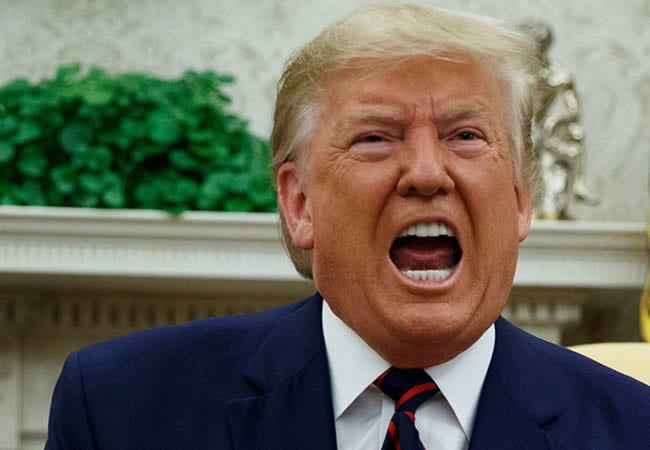News
JUST IN: Tribunal Dismisses APM’s Petition Against Tinubu, Says It’s Abuse Of Court Process

The Presidential Election Petition Court, PEPC, sitting in Abuja, has dismissed as incompetent, the case the Allied Peoples Movement, APM, filed to nullify President Bola Tinubu’s election.
The court held that issues the APM raised in its petition contained pre-election matters that could only be determined by the Federal High Court.
Chairman of the panel, Justice Haruna Tsammani, who read the ruling, upheld preliminary objections that all the Respondents raised to challenge the competence of the petition.
Justice Haruna noted that since the petition centered on the qualification or otherwise of President Tinubu to contest the presidential election that held on February 25, the APM, ought to have gone to court within 14 days after Tinubu was nominated by the All Progressives Congress, APC.
READ ALSO: JUST IN: Tension As Fire Guts Lagos Airport Building
He held that since the cause of action bordered on a pre-election matter, the APM, lacked the locus standi to challenge Tinubu’s nomination.
More so, Justice Tsammani held that the Supreme Court had earlier decided that a political party does not have the right to challenge a nomination that was made by another political party.
He held that section 131 and 237 of the 1999 Constitution, as amended, made provisions for the qualification or disqualification of candidates in an election.
The court noted that the main grouse of the APM was on the alleged invalid nomination of Tinubu’s running mate, Kashim Shettima.
“It is clear that the claim of qualification it non qualification of the the 3rd Respondent (Tinubu) centered on alleged invalid nomination of the 4th Respondent (Shettima).
“It is a pre-election matter,” Justice Tsammani held.
READ ALSO: Presidential Tribunal: How To Watch PEPT Judgement Live
He further held that section 84(3) of the Electoral Act, 2022, stipulated that political parties should not impose qualification criteria on a candidate, except as provided for in the constitution.
According to the court, sections 65, 66, 106, 107, 131, 137, 185 and 187 of the 1999 Constitution, as amended, settled the issue of qualification and nomination of a candidate for an election.
It held that where an election has already been conducted and result declared, the qualification of a candidate could no longer be challenged on the basis of sections 131 and 137 of the Constitution.
The court held that since the APM failed to challenge President Tinubu’s nomination within the constitutionally allowed period, its case, therefore, had become statute barred.
READ ALSO: PEPC: Obi Absent In court As Tribunal Delivers Judgement
It held that where the constitution has qualified a candidate for an election, no other law can disqualify such candidate except the constitution itself.
The court held that the issue of double nomination as canvassed by the APM, was not a legally cognizable ground for disqualification.
Besides, the court held that it found no reason why Mr. Ibrahim Masari was cited as the 5th Respondent in the petition since he would not in any way be affected by the outcome of the case.
Consequently, it struck out his name from the petition.
The APM had in its petition marked: CA/PEPC/04/2023, argued that the withdrawal of Mr. Masari who was initially nominated as the Vice-Presidential candidate of the APC, invalidated Tinubu’s candidacy in view of Section 131(c) and 142 of the 1999 Constitution, as amended.
The party argued that there was a gap of about three weeks between the period that Masari, who was listed as the 5th Respondent in the petition, expressed intention to withdraw, the actual withdrawal of his purported nomination, and the time Tinubu purportedly replaced him with Senator Kashim Shettima.
READ ALSO: PICTORIAL: Shettima, Ribadu, Gbajabiamila Others Present As Presidential Tribunal Delivers Judgement
It further argued that Tinubu’s candidature had elapsed as at the time he nominated Shettima as Masari’s replacement.
According to the petitioner, as at the time Tinubu announced Shettima as the Vice Presidential candidate, “he was no longer in a position, constitutionally, to nominate a running mate since he had ceased to be a presidential candidate of the 2nd Respondent having regards to the provisions of section 142 of the 1999 Constitution”.
The APM contended that Masari’s initial nomination activated the joint ticket principle enshrined in the Constitution, stressing that his subsequent withdrawal invalidated the said joint ticket.
It, therefore, prayed the court to declare that Shettima was not qualified to contest as the Vice-Presidential candidate of the APC as at February 25 when the election was conducted by INEC having violated the provisions the of Section 35 of the Electoral Act, 2022.
“An order nullifying and voiding all the votes scored by Tinubu in the presidential election in view of his non-qualification as a candidate of the APC”.
As well as an order to set aside the Certificate of Return that was issued to the President by INEC, reliefs that were rejected by the court on Wednesday.
News
Accept Free Flights, $3,000 Cash To Leave Or Risk Arrest – US Tells Illegal Immigrants

The United States government has announced a Christmas self-deportation incentive, offering undocumented immigrants free flight tickets and a $3,000 cash bonus to voluntarily leave the country before the end of the year.
The announcement was made in a statement released on Monday, December 22, by the Department of Homeland Security (DHS), which warned that undocumented immigrants who ignore the offer risk arrest, forced deportation, and a lifetime ban from re-entering the United States.
According to the DHS, undocumented immigrants who enrol in the programme before December 31 will receive fully funded travel arrangements to their home countries, along with a $3,000 stipend.
“Illegal aliens who sign up to self-deport through the CBP Home app by the end of the year will receive a $3,000 stipend in addition to a free flight home,” the department said.
READ ALSO:
The initiative is being implemented through the CBP Home mobile application, which allows undocumented immigrants to register for voluntary departure. Participants will also benefit from waived civil fines and penalties related to overstaying or previous failure to leave the country.
DHS said the policy has already yielded significant results, with a marked increase in voluntary departures.
“Since January 2025, approximately 1.9 million illegal aliens have voluntarily self-deported, with tens of thousands using the CBP Home programme,” the statement said.
Homeland Security Secretary Kristi Noem described the initiative as a temporary goodwill gesture tied to the Christmas season, noting that the incentive had been tripled for the holidays.
READ ALSO:
“During the Christmas season, the US taxpayer is generously tripling the incentive to leave voluntarily, offering a $3,000 exit bonus, but only until the end of the year,” Noem said.
She warned that those who fail to take advantage of the offer would face strict enforcement measures.
“Illegal aliens should take advantage of this gift and self-deport. If they don’t, we will find them, arrest them, and they will never return,” she said.
The DHS assured interested migrants that the process is straightforward and fully handled by the government.
“Self-deportation through the CBP Home app is fast, free, and easy. DHS will take care of everything, including travel arrangements,” the department said.
The agency reiterated that undocumented immigrants who ignore the programme would be subject to arrest, forced removal, and permanent restrictions on future entry into the United States.
News
Benue: Five Killed As Suspected Herdsmen Attack Ortese, Block Major Road

No fewer than five youths have reportedly lost their lives in a deadly attack attributed to suspected Fulani herdsmen in Ortese, Guma Local Government Area of Benue State.
According to local accounts, the assailants barricaded the Ortese–Yogbo road during the attack, ambushing and killing the victims at the scene.
Several other residents were said to have been forcibly taken to undisclosed locations.
The assault has sparked widespread fear in the community, with residents expressing concern over their safety as tensions continue to rise.
READ ALSO:Forest Reserve: Okpebholo Broker Peace Between Host Communities, Investors
Community sources revealed that additional bodies are being found in nearby areas, further worsening the situation.
As of the time of filing this report, security agencies have not released an official statement on the incident, although investigations are ongoing and efforts are underway to restore calm in Ortese and surrounding communities.
News
86 Years Memorial Of Capt. Sir Walter Ededuna Obaseki

In loving, ever green and very precious 86 years memorial of our grand patriarch,
His Excellency,
The right honourable,
the most distinguished ambassador
Capt. Sir Walter Ededuna Obaseki (A.K.A Okhien’Ewere)
GBE GCB GCMG KCB KBE CBE OM CH PC DSO
Head of Hovernment
British Administrator
and
Prime Minister in the British Nigerian Government.
Governor of the British Board of Trade.
Captain of the British Merchant navy.
World war II veteran
and a recipient of the world war II campaigns and gallantry medals of honour;
I. The 1939-1945 Star
II. Atlantic Medal
III. British War Medal
IV. Italy Star
Awarded to officers and seamen of the British merchant navy by HRM King George VI
Daddy, your good life is worthy of emulation
Your public works and legacy open great doors for us your descendants
You plotted the skies, mapped the land and chatted the oceans and high seas to threshold development in our great nation Nigeria. as a pioneer industrialist you successfully brought your people to understand and become part of the modern world governnent.
Ededuna Walter Obaseki together with the British established government agencies, built public facilities, institutions and parastatals of government and also brought law and order to the way things are done according to the standards of international best practice as we have it even in The international community.
Those who tried to steal your glory and change the true position of things failed woefully, their evil craftsmanship have since been exposed to everyone because the truth cannot be hidden completely forever.
May your memory never ever go to oblivion!
Just as it is written in The Holy Book
Proverbs 10: 7.
The memory of the just is blessed: but the name of the wicked shall rot.
Psalm 112: 6.
The Righteous Shall be remembered forever!
Signed:
The Scion of Sir Walter Ededuna Obaseki;
Mercy Ededuna Obaseki
for
The entire direct descendants of Capt. Sir Walter Ededuna Obaseki GCMG CBE DSO OM CH PC

 Metro3 days ago
Metro3 days agoJUST IN: Former Edo Information Commissioner Is Dead

 News1 day ago
News1 day agoPHOTOS: New Era In Furupagha-Ebijaw As Okpururu 1 Receives Staff Of Office

 News4 days ago
News4 days agoFormer Delta North senator Peter Nwaoboshi Dies

 News5 days ago
News5 days agoGrassroots To Global Podium: Edo Sports Commission Marks Enabulele’s First Year In Office

 News4 days ago
News4 days ago[OPINION] Tinubu: Ade Ori Okin Befits KWAM 1, Not Awujale Crown

 News4 days ago
News4 days agoCoordinator, Edo First Lady Office, Majority Leader, Rights Lawyer, Others Bag 2025 Leadership Award

 Metro3 days ago
Metro3 days agoShe Grabs, Pulls My Manhood Anytime We Fight — Husband

 News4 days ago
News4 days agoDelta Speaker Advocates Strict Legislative Protection Of N’Delta Environment

 Metro3 days ago
Metro3 days agoWhy I Charged My Husband Money For Sex —Woman

 News1 day ago
News1 day agoFG Declares Public Holidays For Christmas, New Year Celebrations
































